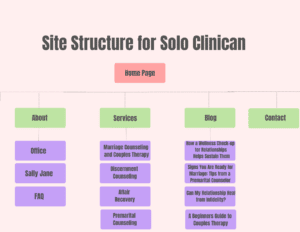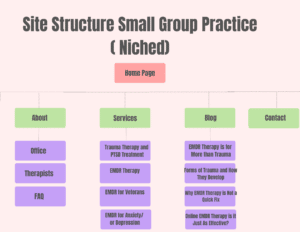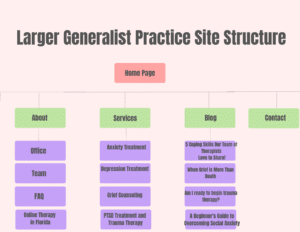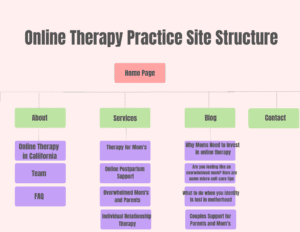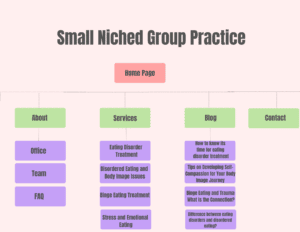If you’ve recently pulled up your website analytics, you may have noticed something strange: your keyword rankings are improving, but your clicks seem to be dropping. For many private practice owners and helping professionals, this can be a confusing and discouraging experience. After all, we’ve been taught for years that climbing the rankings should naturally mean more traffic.
But search has changed.
With the rise of AI Overviews and zero-click search results, users can often get the answers they need without ever leaving Google’s search results page. That means someone could see your business name, read your content summarized by AI, and learn about your services — without ever clicking through to your site.
And here’s the crucial truth: fewer clicks do not mean your SEO isn’t working.
In fact, it may mean your content is performing better than ever. You’re being seen in different ways — ways traditional SEO reports don’t always measure.
That’s why, at Simplified SEO Consulting, especially in the first 90 days of working with a client, we place a heavy focus on what we call a zero-click strategy. It’s all about shifting the focus from chasing clicks to building visibility, authority, and trust signals that will set you up for long-term success.
The Zero-Click Strategy: Building Impressions Before Clicks
In the early stages of SEO, our goal isn’t to send floods of traffic to your site immediately. Instead, we want to build a solid foundation with search engines by increasing your impressions — the number of times your content appears in search results.
Impressions are a powerful early indicator that Google is starting to recognize and trust your website. When your blogs, service pages, and location pages begin showing up more often, you’re planting seeds. Even if users aren’t clicking just yet, they’re seeing your brand name, logo, and practice mentioned repeatedly.
This matters because visibility builds familiarity, and familiarity builds trust.
Especially now, with AI Overviews often summarizing answers right on the search results page, users may feel they don’t need to click through. But if your content is being cited, referenced, or pulled into those summaries, you’re still reaping huge benefits:
- You’re boosting your brand visibility.
- You’re establishing your brand as trustworthy and reliable.
- You’re showing Google that you are a credible authority in your field.
In other words, even without a click, your visibility is working for you behind the scenes.

Why Visibility Matters More Than Clicks
Too often, clicks are treated as the only sign of success. But visibility is actually what drives growth over time — and it’s one of the strongest trust signals for Google.
Here’s how it works:
When Google consistently sees your content showing up across the web — on your own site, on local directories, in review sites, and in AI-generated summaries — it starts to view you as an entity: a known, trusted, authoritative source on a specific topic. This is where E-E-A-T (Experience, Expertise, Authoritativeness, and Trustworthiness) comes in. The more signals you send that you are a reliable expert, the more confidently Google (and AI tools) will feature you in their results.
And here’s the secret: even if people don’t click right away, they’re still noticing your brand name. They’re seeing that Google trusts you enough to place you on the front page. That repeated exposure builds subconscious recognition and credibility — so when they do decide to take the next step, your name will be the one they remember.
That’s why zero-click visibility is so valuable. It builds authority even before someone ever becomes a client.
Rethinking Your Metrics: What to Track in an AI-Driven Search World
Clicks still matter, but they’re no longer the whole story. To accurately measure SEO success in today’s AI-shaped landscape, you have to look at the bigger picture.
Here are the metrics we encourage clients to track — and why they matter:
Impressions Instead of Clicks (Especially Branded Impressions)
Your impression count in Google Search Console shows how often your content appears in search results. If impressions are climbing, it’s a strong sign that your visibility is growing, even if clicks haven’t caught up yet.
Branded impressions — searches that include your business name — are especially powerful. They show that people are starting to recognize your brand and actively look for you.
Brand Mentions Across the Web
Mentions of your brand on review platforms, local directories, and even AI summaries help reinforce your authority. When your name shows up across multiple sources, it tells Google and users that you are a trusted entity.
Think of it as digital word-of-mouth: even if someone doesn’t click, they’ve seen your name and connected it with expertise.
Entity Authority Through Content Structure
Becoming a recognized entity means showing Google you have a body of work around a specific niche. One of the best ways to do this is through a content pyramid structure:
- Write multiple blog posts around one specific topic.
- Link them to a cornerstone blog that summarizes the topic at a higher level.
- Link that cornerstone blog to the related service page on your website.
This interconnected structure shows Google (and AI tools) that you have depth, not just surface-level coverage. It helps solidify you as a topical authority, which makes it far more likely you’ll be pulled into AI Overviews.
Engagement Metrics That Show User Value
If users are clicking less often but staying longer once they do arrive, that’s a huge success signal. Pay attention to:
- Time on page – Are users reading the full content?
- Pages per session – Are they exploring beyond the first click?
- Bounce rate – Are they quickly leaving or sticking around?
- New users vs returning users – Are you attracting new eyes?
- Organic vs direct traffic – Are more users finding you through search over time?
These behaviors show that while traffic may be lighter, it’s becoming more qualified and more engaged — which is exactly what you want.

Seeing the Whole Picture (and Avoiding Panic)
Looking at any one metric in isolation can be misleading.
For example, you might notice that your clicks are down from last month and immediately worry that something is wrong. But if your impressions are climbing, your rankings are holding steady, and your engagement metrics are improving, then your SEO is likely performing well — you’re just experiencing the effects of AI reshaping how people search.
That’s why we always remind our clients: don’t judge your SEO based on clicks alone. Instead, review all of your data — Search Console, Google Analytics, keyword positions, and engagement metrics — to get the full picture of your website’s health.
The Clicks Aren’t the Goal, The Connection Is
In today’s AI-driven search world, success can’t be measured by clicks alone. SEO isn’t just about getting people to your site anymore — it’s about getting your brand seen, trusted, and remembered.
Fewer clicks don’t mean failure. It means your content is doing what it’s supposed to:
- Showing up more often,
- Earning Google’s trust,
- Building familiarity with your ideal clients.
That visibility and credibility will pay off with more qualified leads, more conversions, and stronger long-term results.
Let Us Give You the Tools To Empower Your Website’s Ranking and Visibility
If you’re looking at your numbers and wondering if your SEO is “working,” it’s time to shift how you measure success. Our team at Simplified SEO Consulting specializes in helping professionals like you build visibility, authority, and trust that lasts — even as search evolves.
Let us help you see the whole picture of your website’s health.
Schedule a free consultation today
Other Services to Support Your Growth
At Simplified SEO Consulting, we offer a variety of services to meet you exactly where you are — whether you want to outsource everything or stay hands-on with guidance.
Our Done-for-You SEO Services are ideal for helping professionals who want to improve their Google rankings without having to learn SEO themselves. We take care of everything, from optimizing your website to crafting keyword-rich content, so you can focus on your clients.
Prefer a more self-paced approach? Our DIY SEO Courses are built specifically for therapists and wellness professionals. You’ll learn practical, proven strategies to optimize your website at your own pace, with support from instructors who speak your language.
If you’re looking for direction rather than implementation, our Strategy Sessions offer personalized, 1:1 guidance for both SEO and social media. We’ll walk through your current presence and create a clear, actionable plan you can run with, no guesswork involved.
Need help with behind-the-scenes improvements? Our Technical SEO Services address the foundational pieces that impact how search engines crawl and rank your site, like site speed, mobile optimization, and metadata.
And if words aren’t your thing, we’ve got you covered. Our SEO Copywriting Services combine compelling, human-first language with keyword strategy to help you rank in Google and connect with your ideal clients.
About the Author
Mary Walker is the owner of Simplified SEO Consulting, where she leads with empathy, strategy, and a strong belief that sustainable success is built through collaboration. As a small business owner herself, Mary knows firsthand how challenging it can be to balance leadership with real life — which is why she’s created a company culture rooted in psychological safety, teamwork, and mutual support.
With Master’s degrees in Digital Marketing and Psychology, Mary blends a deep understanding of human behavior with effective, data-driven SEO strategies. But for her, success isn’t just about higher rankings — it’s about helping others grow with confidence, clarity, and purpose.
When she’s not mentoring her team or supporting clients, Mary is likely cheering on her favorite football teams, spending time with her five kids, or crocheting her way to a moment of calm. She’s passionate about showing that it’s not only possible to lead well and live well — it’s essential.



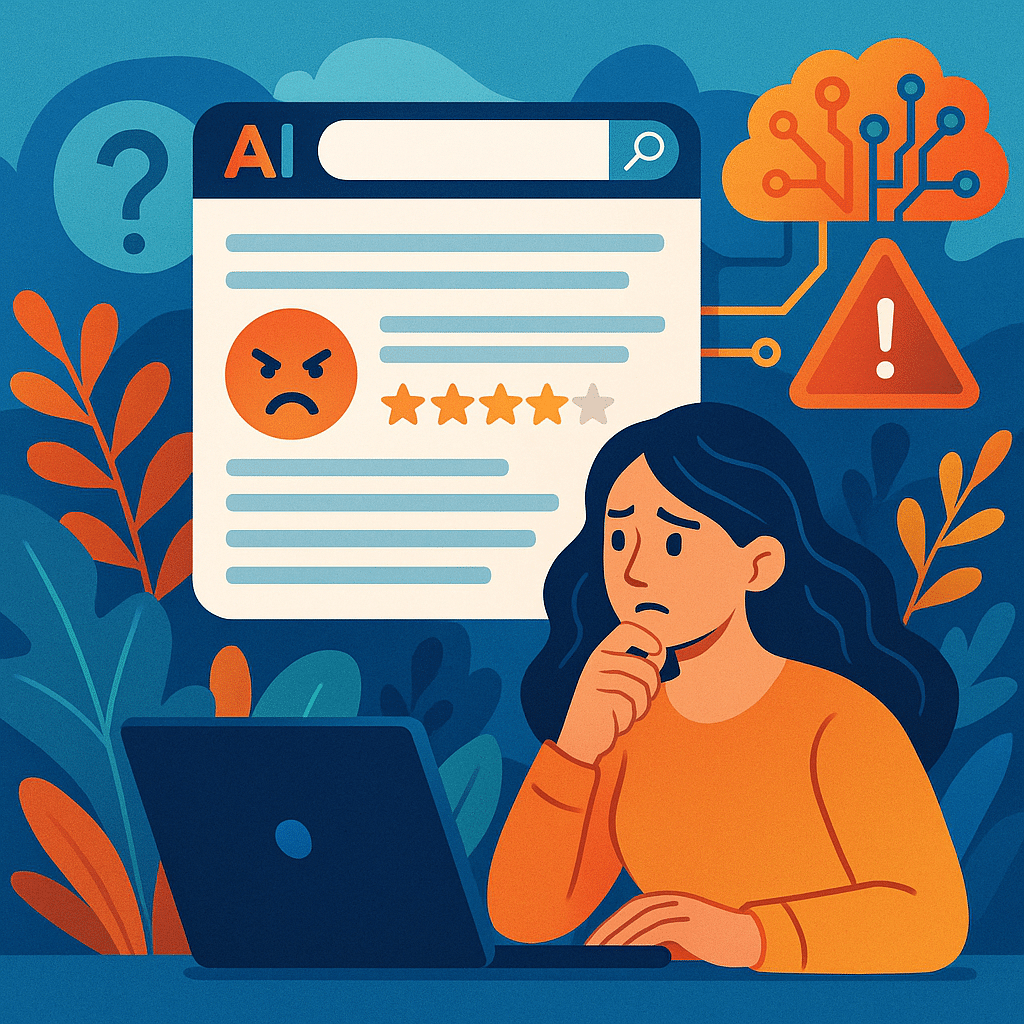
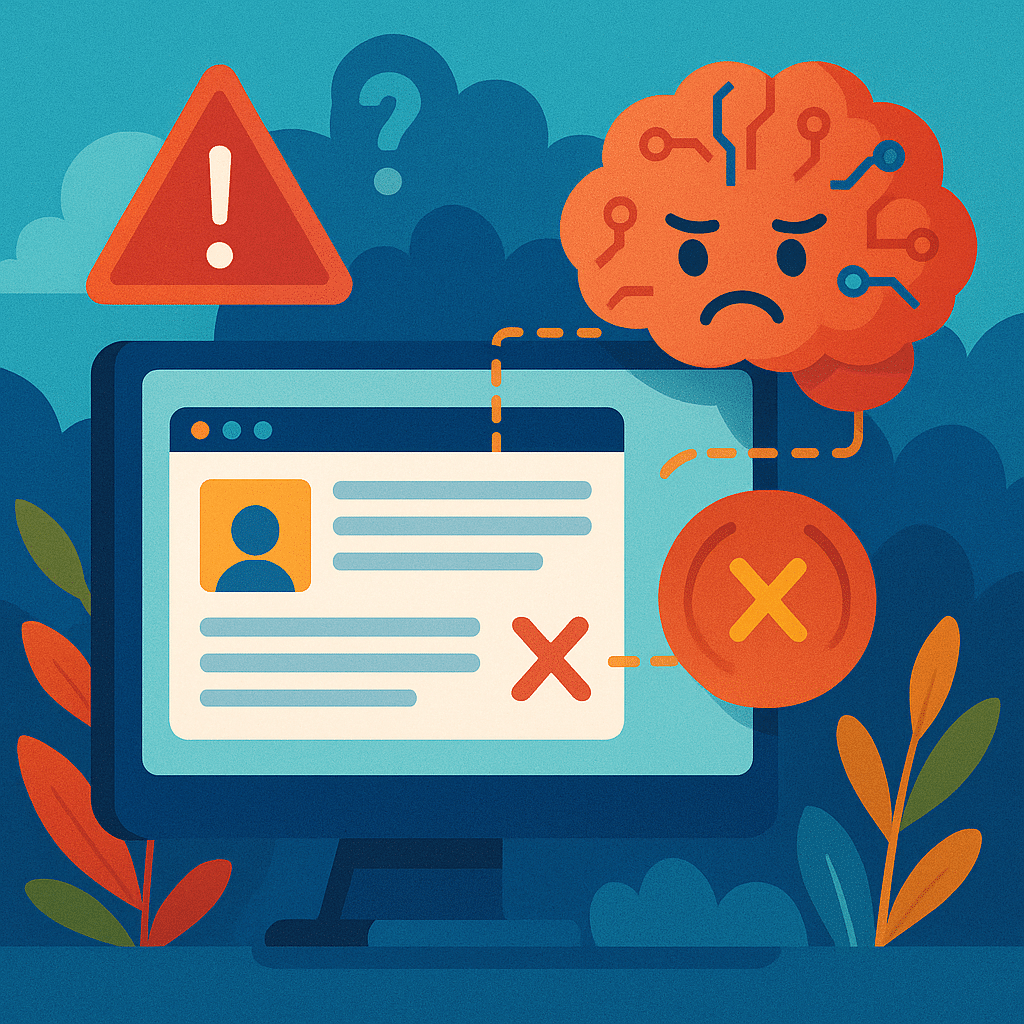










 About the Author, Winnie A Mental Health SEO Specialist
About the Author, Winnie A Mental Health SEO Specialist If you are a trained EMDR therapist in Denver, Colorado, you might choose to optimize a page of your website on virtual EMDR therapy, a page on trauma therapy and PTSD treatment and three supporting blog posts: “Benefits of EMDR for Trauma Therapy”, “EMDR Therapy for PTSD Treatment”, and “Creative Ways EMDR Therapy Can Help Denver, CO Locals”. After going through our Masterclass (the DIY Top of Search Engines Course), you’ll start to implement some of the SEO concepts yourself. Then, during our small group Mastermind sessions, I can pull your website up as an example to provide feedback, live review and what we call “SEO 2.0” for one of those pages. This benefits you AND the trauma therapist in Texas who has recently opened a new Plano location. They are able to take the live review feedback and apply it to their website. And so on, and so on.
If you are a trained EMDR therapist in Denver, Colorado, you might choose to optimize a page of your website on virtual EMDR therapy, a page on trauma therapy and PTSD treatment and three supporting blog posts: “Benefits of EMDR for Trauma Therapy”, “EMDR Therapy for PTSD Treatment”, and “Creative Ways EMDR Therapy Can Help Denver, CO Locals”. After going through our Masterclass (the DIY Top of Search Engines Course), you’ll start to implement some of the SEO concepts yourself. Then, during our small group Mastermind sessions, I can pull your website up as an example to provide feedback, live review and what we call “SEO 2.0” for one of those pages. This benefits you AND the trauma therapist in Texas who has recently opened a new Plano location. They are able to take the live review feedback and apply it to their website. And so on, and so on. Between sessions, I highly encourage participants to get together with other professionals and colleagues from the group for coworking. Apply the concepts from the course together. Live review and feedback is an absolute gift that you can give each other during these times. Is something unclear? Talk about it! Have a suggestion? Don’t hold back. We’re all learning together. So, there’s no fear of looking dumb. No point in holding onto imposter syndrome. We’re all in this together. The other beautiful part of this SEO group training program is that the practice owner doesn’t have to be the person going through the training. You can send a Marketing Manager, a dedicated Virtual Assistant, or another therapist in the practice to learn and implement the concepts. In fact, this has been a wonderfully successful strategy for larger group practices who know they need to step up their marketing and SEO efforts.
Between sessions, I highly encourage participants to get together with other professionals and colleagues from the group for coworking. Apply the concepts from the course together. Live review and feedback is an absolute gift that you can give each other during these times. Is something unclear? Talk about it! Have a suggestion? Don’t hold back. We’re all learning together. So, there’s no fear of looking dumb. No point in holding onto imposter syndrome. We’re all in this together. The other beautiful part of this SEO group training program is that the practice owner doesn’t have to be the person going through the training. You can send a Marketing Manager, a dedicated Virtual Assistant, or another therapist in the practice to learn and implement the concepts. In fact, this has been a wonderfully successful strategy for larger group practices who know they need to step up their marketing and SEO efforts.









